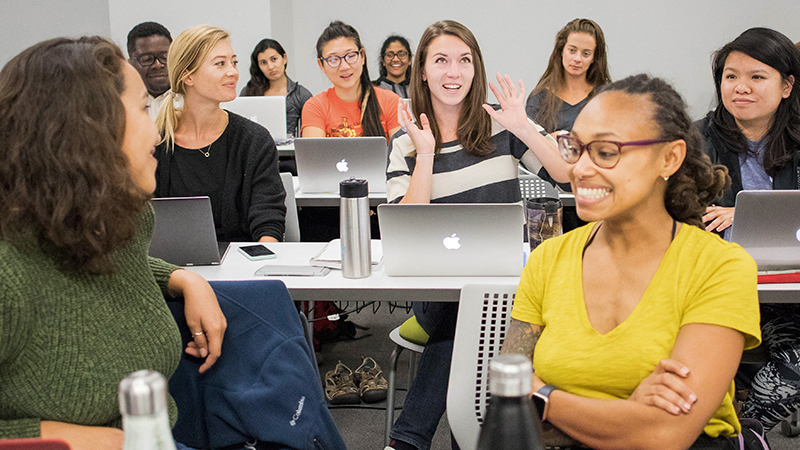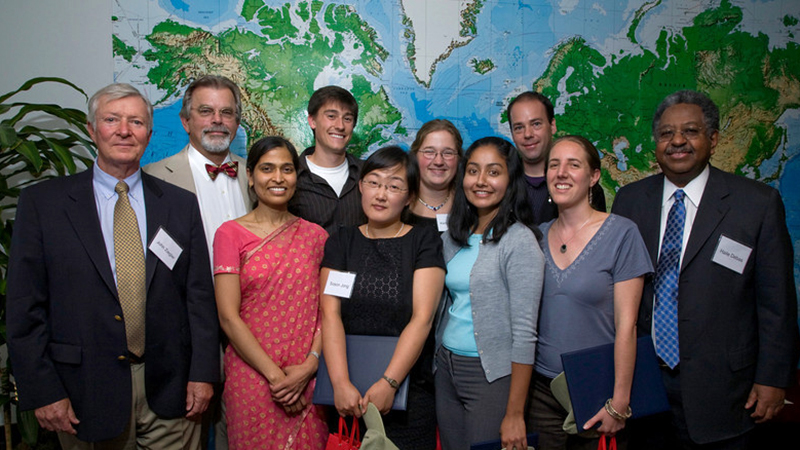
On Friday, July 27, the tenth class of the country’s first global health master of science program will receive its degrees. From its first class in 2008, with just seven students, to the current class of 36, the Institute for Global Health Sciences master’s program has given its students the breadth of tools and skills they need to succeed in global health careers. With this graduation, more than 300 alumni will be making a difference in academia, non-governmental organizations, the private sector and medicine.
Amethyst Gillis ‘11 credits the program with giving her the skills she needed for her current position: working in Cameroon as a pathogen hunter for Metabiota, a San Francisco-based company that specializes in infectious disease outbreaks.
“I am sure I would not be in the career that I have now without the global health sciences program,” she said. “It gave me the knowledge, degree, and hands-on experience I needed to break into the global health field.”
The roots of the program trace back to 2003 when then UCSF Dean of Medicine Haile Debas formally launched Global Health Sciences as a consortium of all global health efforts throughout UCSF, said John Ziegler, the master’s program’s first director.
In the fall of 2006, Ziegler and other members of a committee began working together to come up with the structure and goals of the master’s program. The plan was to move beyond what used to be called “international health” to “health on the planet as a global good for everybody,” Ziegler said.

students in global health.
The committee developed a curriculum incorporating scientific rigor and research methodology combined with crucial nonmedical aspects of global and population health, including a course overviewing global public health and another on social determinants of health, he said.
The committee also wanted to give students the opportunity to put what they learned into practice. “Our aim was to highlight how to help persons who are less affluent and don’t have access to good care or are in remote areas, or are deprived in other ways, and think of ways in which a trainee could learn and help really change the world for people who are disadvantaged,” Ziegler said.
The result was the capstone research project. Students spend an academic quarter working on a research project with faculty and other mentors. This year’s projects included using technology to fight malaria and a project to improve tuberculosis care and information in remote Madagascar.
For Gillis, “the capstone project was key in landing a job at the end of the program, because I had the demonstrated experience that proved I was a good candidate for global health work based in Africa,” she said.
For her capstone, Gillis traveled to Tororo, Uganda, where she worked on a project on drug resistance of the malaria parasite in children. Her mentor, Phil Rosenthal, helped her develop a strong project with clear objectives, she said.
Farrah Kashfipour ’14 came into the program with a number of years’ experience as a nurse. During her time as the Institute’s fellow after graduation, she traveled to West Africa to work with Partners in Health during the 2015 Ebola outbreak. She currently works for Doctors Without Borders and has completed three assignments for the organization, recently returning from Bangladesh where she was an outreach nurse manager at a refugee camp caring for Rohingya Muslims who had fled Myanmar.
At the camp in Bangladesh, she led the establishment of an outbreak alert and response program and helped with community mobilization for diphtheria vaccination campaigns. Setting up the alert and response program was like “setting up a mini CDC [Centers for Disease Control] within the camp,” she said. “The knowledge that I gained from the master’s program helped me plan and implement the program together with my colleagues, enabling us to detect and respond to outbreaks rapidly.”
Robert Salerno ’11 entered the program after his experience as a Peace Corps volunteer in the Fiji Islands and a few years in the private sector with DAI Global, LLC (DAI), a large USAID contractor and global consulting firm. “I needed to have more specialized training, and I wanted to get more depth than one subject,” he said.
Salerno focused on food security and nutrition and the linkage between agricultural development and health. For his capstone, he worked not only with UCSF researchers but also with the College of Agricultural and Environmental Sciences at UC Davis.
He uses the research methods he learned through the program in his current position as senior manager for DAI’s USAID Preparedness and Response project team.
“What I loved about the program was the exposure to different types of research methods. In my industry in international development, implementation research is nice to have, but not a lot of work is being done on what’s working and what’s not. What I learned was how to apply better methodological standards to my work,” he said.
Such research skills are an important part of the program, said Madhavi Dandu, its current director.
“It’s very important to us that our students leave with a really good understanding of what’s been done, what questions remain, how to ask a good question, and what the best methods are to answer that question,” she said.
But because global health is such a new field, it’s constantly evolving, and the program is evolving along with it, Dandu said. To be successful, students need to think beyond diseases to broader issues, including ethics, cultural humility, structural competency, and “interacting with teams across levels of power.” While students learn to dive into specific research on a single topic, they also learn to translate research into meaningful change through policy and understanding health systems, she said.
Dandu has three main goals for students. The first is that they better understand not just global health but what role they’re going to play in it. The second is that the students leave with a set of skills that make them flexible and able to work in a variety of environments. And the third is that the students are connected to a strong community of alumni.
“One of the most fun parts of our program is that the students form an incredibly tight cohort,” she said. “And I really think that that’s important from a career perspective and life perspective that they have a community going forward.”
Current student Lucia Abascal is looking forward to joining this community. “This program is my entry ticket to start my career as a global health professional,” she said. Abascal came into the program to focus on population health after working as a general physician in a rural small town in Mexico.
Her experience in the program was “eye-opening that so much exists beyond clinical medicine. In my training as a doctor, I had never learned about subjects like health economics, systems, and policy, which I find fundamental to understand health. It was also incredible to be in such a good work environment surrounded with people with different backgrounds but similar interests.”
Current student Resego Bokete is also eager to make a difference. She plans to become a physician for underserved populations and feels the program has given her one skill in particular that will prove invaluable.
“I’ve learned how to assess a situation and literally think before I act,” she said. For example, the program includes discussions about choices politicians make that the students might not agree with.
“I’ve been able to put myself in another person’s shoes to try to understand how they’re looking at the situation and to understand why they’re making that decision,” she said. “I think that’s the quality that I’m most grateful to have learned.”
Alumni Reunion Celebrates Program’s 10th Anniversary
To celebrate the 10th anniversary of its master’s program, the Institute for Global Health Sciences is hosting its first alumni reunion on Friday, July 27 at Mission Hall.
More than 150 alumni, faculty, staff and friends will gather to mark the milestone. Many of the program’s newest alums—the class of 2018, who will graduate earlier in the day—will be among those attending.
Evan Bloch ’10 will be the featured speaker. Now a medical doctor and assistant professor of pathology at Johns Hopkins University School of Medicine, Bloch conducts research on neglected (e.g. Babesia) and emerging infectious diseases (e.g. Zika, Oropouche, Mayaro viruses), particularly in the context of blood transfusion safety.